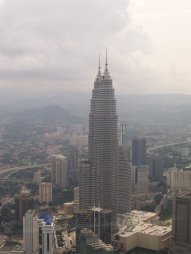Here is a round-up of some of the latest Business stories of interest from around the major players in Asia.
SINGAPORE: Source: Business Times
SINGAPORE OUTPUT UP
Singapore's factory output probably rose in November from a year earlier when regional manufacturing supply chains were disrupted by floods in Thailand.
But the sector remains weak, with little growth expected on a month-on-month basis, amid continued weakness in Western economies that has crimped demand for Singapore-made electronic component and products. Singapore exports most of what it produces and its trade is three times gross domestic product.
SOUTH KOREA: Source: The Korean Herald
PRESIDENT ASKS BIG FIRMS TO AVOID LAYOFFS
President-elect Park Geun-hye has spoked out to ask firms to avoid redundancies. She also called on owners to take self-reform measures and cooperate with her economic policy aimed at boosting fairness and transparency in the market and increasing welfare for low-income citizens.
“I will actively support investment aimed at creating future growth engines and jobs. I urge large conglomerates to change your ways as well,” Park said during her meeting with the representatives of large businesses at the Federation of Korean Industries.
KORAIL SAFETY QUESTIONED
Local passengers raised their eyebrows when the state-run railway operator Korail claimed the safety and on-time operation of its trains as global No. 1 in a report submitted for evaluation in June.
At the time, Korail was suffering from public condemnation after a series of frequent breakdowns and delayed schedules of the nation’s KTX bullet trains. Korail explained that it had cited official data from the International Union of Railways, or UIC, and then the agency was designated as one of the best state-owned companies of the year.
JAPAN: Source: Japan Times
HALAL FOODS ON THE RISE IN JAPAN
According to the U.S. Halal Association, the total global Muslim population is estimated at 1.6 billion, or around 25 percent of the world's population, with the $632 billion halal food market accounting for 16 percent of the global food industry.
The number of visitors to Japan from Indonesia, home to the biggest Muslim population in the world, as well as from Malaysia, where about 60 percent of the population is Muslim, jumped between 2003 and 2010, according to the Japan National Tourism Organization. The JNTO says the number of Muslim travelers to Japan is generally on the rise, although official data on Muslims are not available.
Seeing it as a business opportunity, some Japanese nonprofit organizations as well as private firms have started offering services assisting Japanese businesses to obtain halal accreditation.
JAPAN AND BURMA TO BUILD INDUSTRAIL ZONE
Myanmar and Japan agreed to start work next year on a huge industrial zone near Yangon, officials from the two countries said, as the impoverished nation hungrily eyes foreign investment. The 2,400-hectare Thilawa project will include a port and industrial park and be up and running in 2015, according to the Ministry of Economy, Trade and Industry.
Former junta-ruled Myanmar craves investment to spur growth and boost its dilapidated infrastructure, while export-reliant Japan is hunting new opportunities in the resource-rich nation to offset sluggish domestic growth.
MALAYSIA: Source: Business Times
MALAYSIAN AIRLINES BUYS 36 NEW PLANES FOR ITS FLEET
Malaysia Airlines has purchased 36 new ATR 72-600 aircraft worth RM3 billion. Malaysian Airlines (MAS) and French-Italian aircraft manufacturer ATR inked a memorandum of understanding (MoU) yesterday on the purchase of the turboprop planes.
Of the total ordered, Firefly will take on 20 aircraft, while 16 will be introduced into the fleet of its sister company MASwings.
MAS chief executive Ahmad Jauhari Yahya said MAS wants to do more, in terms of turboprop operations, and is looking at expanding Firefly's operations out of Peninsular Malaysia into regional routes such in Indonesia, Thailand and Singapore, as well as increasing the frequency of its domestic routes.
CHINA: Source: China Daily
MILD REFORM URGED IN BEIJING
More than 70 prominent Chinese scholars and lawyers have urged the country's new Communist Party leaders to undertake moderate political reforms including separating the party from government, though they avoid any mention of ending one-party rule.
The petition drafted by Peking University law professor Zhang Qianfan calls on the party to rule according to the constitution, protect freedom of speech, encourage private enterprise and allow for an independent judicial system. It also calls for the people to be able to elect their own representatives without interference from the Communist Party.
WAGES INCREASE AND THE STRONGER YUAN MEANS LESS HIRING
The manufacturing industry's demand for new employees shrunk by more than 20 percent year-on-year in the first three quarters of this year, according to a recent survey released by the Seebon Human Resources Research Institute.
Among industries, shipping showed the greatest hiring demand, as the need for more employees in transportation, warehousing and postal services increased steadily in the first nine months of 2012, the report said. Contributing to that result has been the success of e-commerce and the ever-tenser competition among online shopping malls. Industrial restructuring has also led to the disparities in hiring demand, said analysts at the Seebon Human Resources Research Institute.
The survey also said the reduction in job opportunities has resulted in part from the international market's declining interest in products manufactured in China, and the greater number of robots now performing jobs formerly done by people.
INDIA: Source: Reuters
KINGFISHER STILL GROUNDED
Kingfisher Airlines has failed to present regulators with a clear funding plan under a proposal to get it flying again, the country's aviation minister said on Wednesday.
The airline, owned by liquor tycoon Vijay Mallya and suspended in October over unpaid debts and salaries, submitted a plan on Monday to the Directorate General of Civil Aviation (DGCA) to resume a limited service. According to local media reports, Kingfisher's parent company, UB Group, offered to inject 6.5 billion rupees ($118.3 million) into the carrier - a key condition for getting it airborne again.
#businessnews #asia




